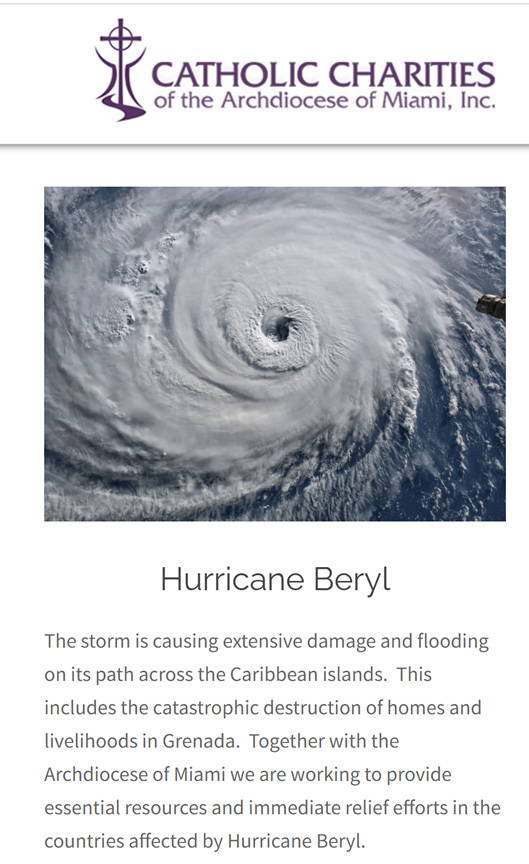By Tom Tracy - Florida Catholic
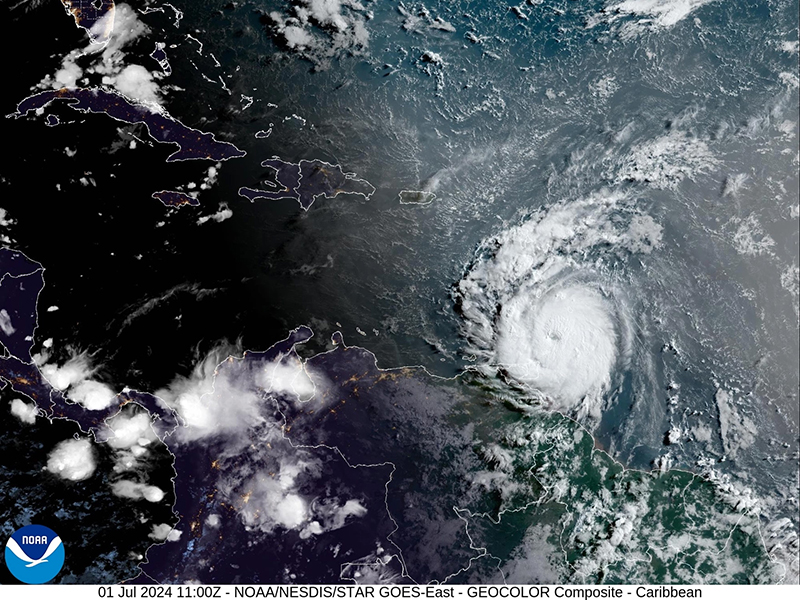
Photographer: COURTESY: NOAA/NESDIS/STAR GOES-East
A satellite image of Hurricane Beryl on Monday, July 1 as it passes through the Lesser Antilles region of the Caribbean.
MIAMI | In his first public address since Hurricane Beryl passed the Lesser Antilles region of the Caribbean as the earliest formed Category 5 hurricane on record, the Bishop of St. George’s in Grenada offered a spiritual message of hope and resilience via social media following Beryl's devastating impact on the island as a Category 4 on July 1.
Beryl was the second named storm of the 2024 hurricane season and had significant impacts on Jamaica, the Cayman Islands, and the Yucatan Peninsula in Mexico before making landfall somewhere north of Mexico or south of Texas in the United States in the coming days.
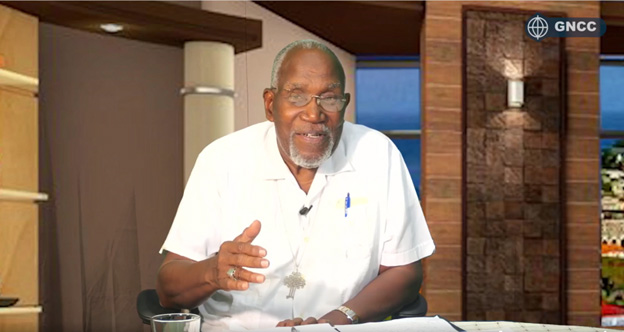
Photographer: COURTESY Good News Catholic Communications of the Diocese of St. George
Bishop Clyde Martin Harvey of the Diocese of St. George's in Grenada, in his first appearance following the devastating impact of Category 4 Hurricane Beryl on the Lesser Antilles region of the Caribbean on July 1, offered a spiritual message of hope and resilience on July 4, 2024, through a program produced by Good News Catholic Communications of the Diocese of St. George.
The islands of Carriacou and Petite Martinique, which are part of Grenada, have borne the brunt of the destruction in that diocese, along with parts of Grenada that remained isolated due to poor communications as of July 4, according to Bishop Clyde Martin Harvey of the Diocese of St. George’s in Grenada.
The country's Prime Minister Dickon Mitchell, in a briefing after visiting these islands, said they were ravaged by Beryl on Monday, as were some of the nearby settlements of the Grenadines.
Bishop Harvey spoke July 4 about the spiritual and material impacts of the first major hurricane to severely affected this area since 2004’s Hurricane Ivan.
“After the storm, I would like to invite you to go through the whole series of feelings you had and acknowledge and claim them; a part of you died in that storm, but thanks be to God, few of us are able to say that a relative died,” the bishop said, noting the spiritual implications of enduring Beryl.
He also hosted a live call-in program broadcast via YouTube and Meta, during which his diocesan radio and television ministry showed the first images of the severe damage to the church and other property throughout the diocese. He took phone calls from local clergy and parishioners reporting on their experience with Beryl.
“My own experience of the storm was one in which I felt a bunch of hyenas circling the house, trying to get in. And when that stopped for a while I was afraid… to go out. I wasn’t sure what was outside that door, but in that stillness a glimmer of hope emerged that perhaps we were safe.”
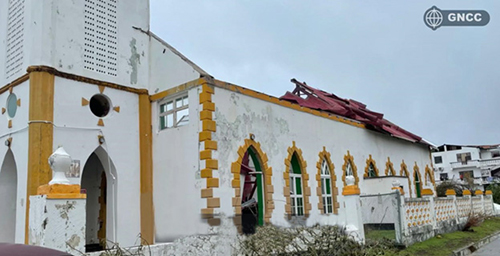
Photographer: COURTESY Good News Catholic Communications of the Diocese of St. George
Images of properties and churches in the Diocese of St. George's in Grenada, destroyed by Hurricane Beryl after it passed through the islands on July 1, 2024, as a category 4.
Bishop Harvey noted that there was much to be thankful for because of the widespread preparations made to reduce the loss of life during Beryl, and he urged parishes and Caritas staff to work together in finding those in need of immediate help and provisions.
Speaking through the diocesan Good News Catholic Communications program, Bishop Harvey noted that a local Youth Emergency Action Committee had been stablishing a presence in many parishes to help form a response effort.
Meanwhile, press reports indicated that government officials were working to stablish a field hospital on the island of Carriacou, whose only permanent hospital lost most of its roof to the hurricane. Two deaths were confirmed there, and the island remained without power.
Bishop Harvey noted that one of the takeaways from the devastation in Caracou and Petite Martinique is the need for changes during rebuilding in those areas.
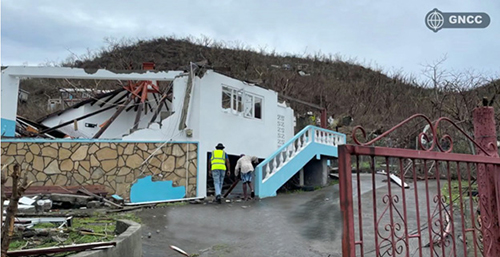
Photographer: COURTESY Good News Catholic Communications of the Diocese of St. George
Images of properties and churches in the Diocese of St. George's in Grenada, destroyed by Hurricane Beryl after it passed through the islands on July 1, 2024, as a category 4.
“There is an opportunity to decide who we will become, what kind of communities we will be and what kind of homes we will construct,” he said, adding that the region needs to take a “deliberate and considered” approach that respect the wishes of local residents.
The Diocese of St. George serves an estimated 46,485 Catholics in 20 parishes. It is a suffragan of the Metropolitan Archdiocese of Castries (Saint Lucia) and a member of the Antilles Episcopal Conference.
The bishop made a special appeal to family and friends of Grenada living abroad: “Don't rush to send this and that, find out what is needed; find out from your families what they want to do, and give them the opportunity to make these decisions for themselves,” he said.
In Miami, the archdiocesan Catholic Charities agency had launched a donation portal, while Baltimore-based Catholic Relief Services has reported that it had a field person working in Grenada to assess the extent of the damages, according to Robyn Fieser, CRS regional marketing manager for Latin America and the Caribbean.
Communities across Grenada, Saint Vincent and the Grenadines, Dominica, Antilles, Jamaica, Haiti, Mexico and other countries in the storm’s path will need emergency relief, protection and recovery, according to a CRS statement. In Grenada, 98% of buildings, home to some 6,000 people, are damaged or destroyed. Most families collect rain from rooftops, which is a low-cost way to store drinking water. According to CRS damage to homes are so severe that drinking water is running out.
Assistance will prioritize shelter, water, sanitation and hygiene, as well as access to food and essential supplies.
Bishop Harvey asked his flock to begin thinking about how God is calling his people to start anew as they move forward in recovery and response following Beryl.
“So we have a moment to start over again; there are people who need a lot of help, who need food and therefore they have to be attended to.”

